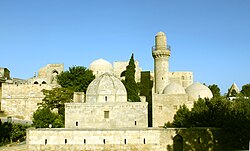This is a list of wars involving the Republic of Azerbaijan and its predecessor states, the Azerbaijan Democratic Republic and the Azerbaijan Soviet Socialist Republic.
| History of Azerbaijan |
|---|
 |
This is a list of wars involving the Republic of Azerbaijan and its predecessor states, the Azerbaijan Democratic Republic and the Azerbaijan Soviet Socialist Republic.
| Conflict | Combatant 1 | Combatant 2 | Results |
|---|---|---|---|
| World War II (1939–1945) | | Victory | |
| Soviet–Afghan War (1979–1989) | Defeat
|
| Conflict | Combatant 1 | Combatant 2 | Results |
|---|---|---|---|
| First Nagorno-Karabakh War (1988–1994) | |
| Defeat Armenian victory [7] |
| 2016 Nagorno-Karabakh conflict [ citation needed ] (2016) | Inconclusive Inconclusive (see aftermath ) | ||
| Second Nagorno-Karabakh war (2020) | Victory Azerbaijani victory [12] [13] | ||
| Azerbaijani offensive in Nagorno-Karabakh (2023) | Victory [14] |
| Mission | Start-date | End-date | Location | Troops (peak) |
|---|---|---|---|---|
| | 1999 | 2008 | 34 | |
| | 2003 | 2008 | 250 | |
| | 2008 | 2021 | 94 |
The war ended at Ceasefire Agreement in 1994, with the Armenians of Karabakh (supported by Armenia) taking control not only of Nagorny Karabakh itself but also occupying in whole or in part seven regions of Azerbaijan surrounding the former NKAO.
Azerbaijan presents its operations of 2–5 April 2016 as a tactical victory and psychological breakthrough.
President Ilham Aliyev, for his part, posted an image on Instagram of himself wearing military fatigues with the caption, "The April War was our glorious historical victory."
....It was noted that during the military actions unleashed by Azerbaijan, the RA Armed Forces fulfilled their task. The NKR Defence Army was victorious in thwarting Azerbaijani aggression and frustrating its plans.
Azerbaijan's historic win was an important geopolitical coup for Erdogan who has cemented Turkey's leading role as a powerbroker in the ex-Soviet Caucasus region.
The BBC's Orla Guerin in Baku says that, overall, the deal should be read as a victory for Azerbaijan and a defeat for Armenia.
The offensive was seen as a major victory for Azerbaijan, which won a 2020 war with Armenia and has since sought to repopulate Karabakh.